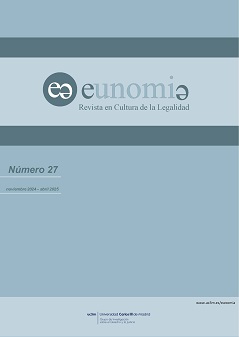Aplicación de la Inteligencia Artificial a la toma de decisiones judiciales
Resumen
La Inteligencia Artificial (IA) ha irrumpido en el ámbito del Derecho para quedarse, despertando varias incógnitas acerca de su verdadero alcance y utilidad práctica. Uno de los momentos procesales que más se ha estudiado de cara a una automatización digital es la toma de decisiones judiciales, pero la incapacidad de los instrumentos de IA para motivar las soluciones que puedan ofrecer para un determinado caso limita esa sistematización. Aun así, las herramientas de IA pueden proporcionar auxilio judicial a través de algoritmos de evaluación de riesgos y otros sistemas expertos jurídicos, además de existir la posibilidad de crear tribunales digitales sin emular el razonamiento del juez y prescindiendo de la motivación en los casos simples susceptibles de una automatización también analógica. En este trabajo estudiaremos tales instrumentos de IA, su eficacia y utilidad y la afectación al deber de motivación que supondría la sustitución judicial digital.
Descargas
Citas
Angwin, J., Larson, J., Mattu, S., Kirchner, L. (2016). Machine bias. Propublica. https://n9.cl/zizk
Barona Vilar, S. (2021). Algoritmización del Derecho y de la justicia: de la Inteligencia Artificial a la Smart Justice. Tirant lo Blanch.
Bench-Capon, T., Prakken, H. y Sartor, G. (2009). Argumentation in Legal Reasoning. En I. Rahwan y G. Simari (Eds), Argumentation in Artificial Intelligence (pp. 363-382). Springer.
Bourcier, D. (2003). Escritura y modelización del derecho. En P. Casanovas, (Edit.), Inteligencia artificial y derecho (pp. 75-92). Editorial UOC.
Canale, D. y Tuzet, G. (2021). La justificación de la decisión judicial. Palestra Editores.
Caperochipi Cabasés, L. (2022). RISCANVI, el algoritmo del que depende tu libertad. Legal Today. https://n9.cl/c8ivf
Cotino Hueso, L. (2019). Riesgos e impactos del big data, la inteligencia artificial y la robótica. Enfoques, modelos y principios de la respuesta del derecho. Iustel. Revista General de Derecho Administrativo, 50.
Dieterich, W., Mendoza, C., y Brennan, T. (2016). COMPAS Risk Scales: Demonstrating Accuracy Equity and Predictive Parity. Northpointe. https://n9.cl/p1yo3
Eticas Foundation (2022). Riscanvi, an algorithm to predict whether a prisoner will commit a violent offense if temporarily released from jail. Eticas Foundation. https://n9.cl/2wzpf
García Amado, J. A. (2013). Razonamiento jurídico y argumentación: nociones introductorias. Eolas Ediciones.
Ground-truth data cannot do it alone. (2011). Nature Methods 8 (885). https://doi.org/c46422
Guzmán Fluja, V. C. (2021). Automated Justice. La preocupante tendencia hacia la justicia penal automatizada. En L. M. Bujosa Vadell (Dir.), Derecho Procesal: retos y transformaciones (pp. 339-380). Atelier.
Kahane, H., Hausman, A., Boardman, F. (2021). Logic and Philosophy: A Modern Introduction. Hackett Publishing Company.
Kelly, J. E. y Hamm, S. (2013). Smart Machines. IBM’S Watson and the Era of Cognitive Computing. Columbia Business School.
Lancho Pedrera, F. (2003). Los sistemas expertos en el derecho. Anuario de la Facultad de Derecho, 21, 629-636. https://n9.cl/y7dgi
Legg, M. y Bell. F. (2020). Artificial Intelligence and the Legal Profession. Hart Publishing.
López Oneto, M. (2019). Fundamentos para un derecho de la inteligencia artificial. Tirant lo Blanch.
McCarty, L. T. (1977). Reflections on “Taxman”: An Experiment in Artificial Intelligence and Legal Reasoning. Harvard Law Review, 90 (5), 837–893.
Nieva Fenoll, J. (2018). Inteligencia artificial y proceso judicial. Marcial Pons.
Palma Ortigosa, A. (2022). El ciclo de vida de los sistemas de Inteligencia Artificial. Aproximación técnica de las fases presentes durante el diseño y despliegue de los sistemas algorítmicos. En L. Cotino Hueso (Dir.), Derechos y garantías ante la inteligencia artificial y las decisiones automatizadas (pp. 29-51). Aranzadi.
Parra, S. (2019). Así se usan las redes bayesianas para hacer funcionar los sistemas expertos de una IA. Xataka Ciencia. https://n9.cl/fo89w
Perelman, C. (2017). De la justicia, de la interpretación y razonamiento jurídico. Ediciones Olejnik.
Pérez Luño, A. E. (1997). Manual de Informática y Derecho. Ariel Derecho.
Rodríguez Puerto, M. (2020). ¿Puede la inteligencia artificial interpretar normas jurídicas? Un problema de razón práctica. Cuadernos Electrónicos de Filosofía del Derecho, 44.
Rodríguez, A. L. (2019). Una aproximación general al transhumanismo y su problematización. ANÁLISIS, 51 (95), 319-345.
Searle, J. R. (1980). Minds, brains and programs. The behavioral and brain sciences, 3,417-457.
Soeteman, A. (1989). Logic and Law. Kluwer Academic Publishers.
Solar Cayón, J. I. (2019). La Inteligencia Artificial Jurídica. Aranzadi.
Solar Cayón, J. I. (2020). La inteligencia artificial jurídica: nuevas herramientas y perspectivas metodológicas para el jurista. Revus, 41. https://doi.org/h2w3
Spielkamp, M. (2017). Unámonos para evitar la discriminación de los algoritmos que nos gobiernan (Woods, T. Trad.), MIT Technology Review. https://n9.cl/77dvn4
Stelmach J. & Brożek B. (2006). Methods of legal reasoning. Springer.
Supreme Court of Wisconsin, Case nº 2015AP157-CR. https://n9.cl/8irqs
Taruffo, M. (1998). Judicial Decisions and Artificial Intelligence. Artificial Intelligence and Law, 6 (3), 311-324.
Toulmin, S. E. (2019). Los usos de la argumentación. Marcial Pons.
Diario del Derecho de Iustel. (12 de mayo, 2022). Un nuevo algoritmo amplía el número de penas susceptibles de cancelación automatizada. Diario del Derecho Iustel. https://n9.cl/93xqh
Yong, E. (2018). A Popular Algorithm Is No Better at Predicting Crimes Than Random People. The Atlantic. https://n9.cl/9bu1z
Eunomía. Revista en Cultura de la Legalidad es una revista debidamente registrada, con EISSN 2253-6655.
Los textos publicados en esta revista están –si no se indica lo contrario– bajo una licencia Reconocimiento-Sin obras derivadas 3.0 España de Creative Commons. Puede copiarlos, distribuirlos y comunicarlos públicamente siempre que cite su autor y la revista y la institución que los publica y no haga con ellos obras derivadas. La licencia completa se puede consultar en: http://creativecommons.org/licenses/by-nd/3.0/es/deed.es




